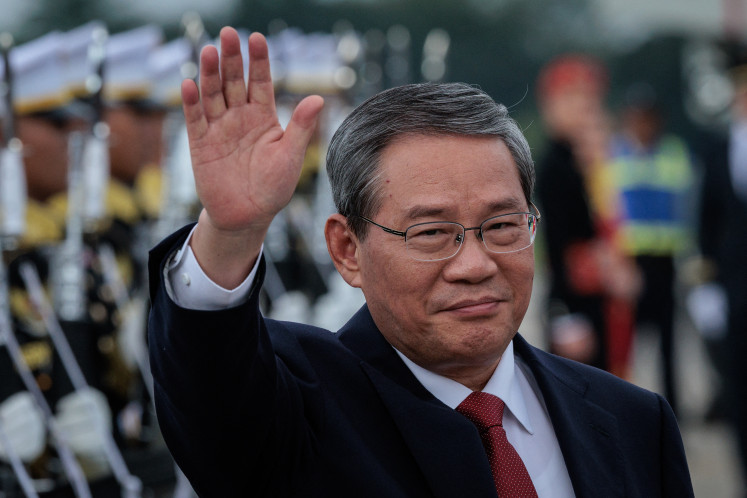ASEAN should duly reconsider its decision-making process
ASEAN seems to have demonstrated its commitment to trying to address the lingering problem of Myanmar by crafting the Five-Point Consensus.
Change text size
Gift Premium Articles
to Anyone

I
n his parliamentary reply in March 2023, Malaysian Foreign Minister Zambry Abdul Kadir said the conflict in Myanmar had to be resolved collectively by ASEAN so that it would not become a regional flash point.
He also stressed that no ASEAN nation should attempt to resolve the issue unilaterally and that ASEAN needed to adhere to the Five-Point Consensus (5PC).
The 5PC was attached to the statement by the ASEAN chairman in conjunction with the ASEAN Leaders’ Meeting held on April 24, 2021, in Jakarta. Pursuant to the 5PC, ASEAN seeks to resolve the Myanmar fiasco.
To its credit, ASEAN clearly expressed its profound concern about the situation in Myanmar, including reports of fatalities and escalation of violence in the aforesaid ASEAN’s chairman statement.
In the 5PC, ASEAN, inter alia, seeks a peaceful solution in the interests of the people and in turn shall facilitate mediation of the dialogue process, with the assistance of the ASEAN secretary-general.
Under international law, seeking to resolve any international issues or disputes via peaceful means is strongly encouraged. In fact, we may say that was the reason for the establishment of the United Nations.
The principle that states shall settle their international disputes by peaceful means simply denotes they have to find ways of resolving the problems in such a manner that international peace and security and justice will not be endangered.
Be that as it may, it is submitted that the 5PC is a step in the right direction. Apart from that, agreeing to resort to mediation is also a commendable move. After all, mediation is clearly spelled out in the UN Charter as well as in the 1982 Manila Declaration of Peaceful Settlement of International Disputes as being one of the recognizable peaceful means under international law.
It is equally fascinating to note that in resorting to the mediation process, ASEAN has also agreed to obtain the assistance of the ASEAN secretary-general.
In international law parlance, seeking the assistance of the ASEAN secretary-general is akin to seeking good offices in resolving the Myanmar problem. This may also be seen as preferring shuttle diplomacy in resolving disputes or conflicts.
The 1899 and 1907 Hague Conventions for the Pacific Settlement of International Disputes provide specific provisions establishing good offices as one of the peaceful methods of settlement of disputes.
Unlike Article 33 of the UN Charter, which is silent on the issue of deploying good offices in resolving international quandaries, the 1982 Manila Declaration explicitly places good offices on an equal footing with other peaceful methods such as negotiation, conciliation, inquiry, arbitration and adjudication.
All in all, ASEAN seems to have demonstrated its commitment to trying to address the lingering problem of Myanmar by crafting the 5PC. Whether the 5PC is effective in finding cures for Myanmar's ailments remains to be seen.
The Myanmar issue had been gaining widespread traction on the global scene when the issue landed in the International Court of Justice (ICJ) when Gambia brought a suit against Myanmar for alleged crimes of genocide.
Gambia filed the case pursuant to the 1948 Convention on the Prevention and Punishment of the Crime of Genocide, having been backed by 57 members of the Organization of Islamic Cooperation (OIC).
As the case has a criminal dimension as well, the pre-trial chamber of the International Criminal Court (ICC) has moved an action by allowing the investigation against Myanmar under the Rome Statute upon request by Fatou Bensunda, a Gambian lawyer and a former prosecutor of the ICC.
The ICC pre-trial chamber also ruled that the court may exercise jurisdiction over the alleged deportation of the Rohingya people from Myanmar to Bangladesh.
In September 1998, the ICC chamber decided – by majority – that the court may exercise jurisdiction over the alleged deportation of the Rohingya people from Myanmar to Bangladesh.
When Malaysia reminded all that the conflict in Myanmar must be resolved collectively by ASEAN, it, unfortunately, did not sit well in some quarters.
To critics, it seems that such a statement merely reiterates or reaffirms the principle of consensus firmly held by ASEAN in its decision-making process.
The "doctrine of consensus", the essential charter trait of "The ASEAN Way", has always been subject to ferocious criticism by the international community.
Since its inception, ASEAN has been seeking to resolve any disagreement among the member states by consensus. This doctrine is entrenched in the ASEAN Charter. To be fair, it is perfectly understandable for ASEAN to be faithfully beholden to the “consensus doctrine”.
As rightly pointed out by Bilharin Kausikan "consensus decision-making reassures the small ASEAN countries that the big – Indonesia – cannot impose its will upon them, and it reassures the big that the small will not gang up against it. Any other means of making decisions would only accentuate innate suspicions and create a risk of small disagreements escalating into major conflicts".
Apparently, ASEAN has been consistent in defending this startling tradition as may be reflected in the other regional treaties such as the ASEAN Agreement on Transboundary Haze Pollution.
While the principle of consensus dearly held by ASEAN may be considered to be a laudable move in securing and maintaining peace in the region, there are unfortunately some negative aspects of such a mind-boggling policy.
One of such negative repercussions is that it would inadvertently create the application of sort of a veto power system, according to some critics.
To add salt to the injury, the majority members of ASEAN may need to unnecessarily tolerate the blatant human rights abuses unduly perpetrated by any state member which elects not to adhere to the decision of the majority in ensuring the human rights violations are effectively redressed.
Be that as it may, it is respectfully submitted that it is high time for ASEAN to seriously reconsider its position on the doctrine of consensus in its decision-making process. Yes, the consensus doctrine has its own merits. But it has its own demerits too.
Observing its 56th anniversary, perhaps ASEAN badly needs to amend its Charter by moving from the consensus-based decision to a majority-based decision in its decision-making process, at least on certain occasions.
***
The writer is a former Malaysian deputy minister of law, member of parliament and practicing lawyer for almost 25 years.









